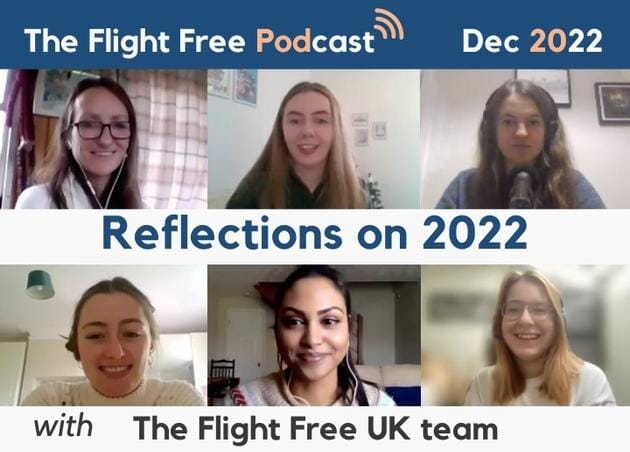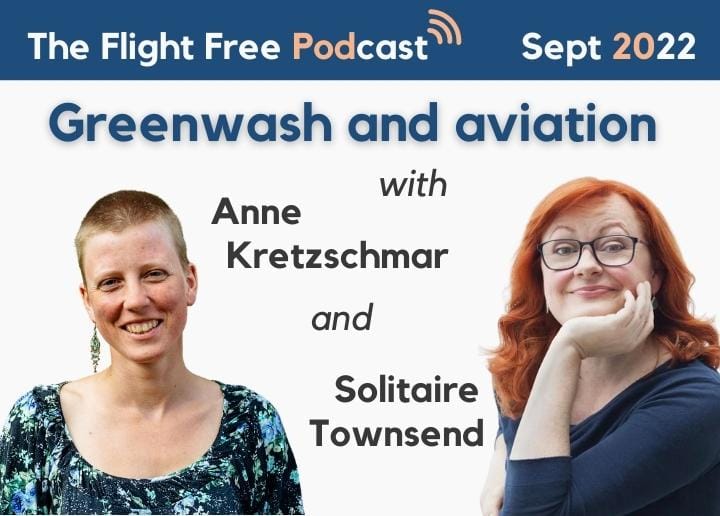This is episode 9 of our 2022 podcast series. Listen to the episode here and find other episodes and previous series here.
In this episode we explore the issue of education and air travel, with guests Abi Whitefield from the University of St Andrews, and Milan Klöwer from the Oxford University Flying Less Group
Flight Free Fact
According to a study at one Swiss university, professors take on average 3.75 flights per year, emitting approximately five tons of CO2 equivalent. This is more than three times the annual carbon budget we each need to reach in order to limit global warming to 1.5ºC.
Flight Free UK
Abi, you were studying at Edinburgh University when you decided not to attend one of your class field trips, even though it was a compulsory part of the course, because it would mean flying to Morocco. Can you tell us more about this?
Abi
In 2019 I was studying for a Masters in environmental protection and management at the University of Edinburgh.
The field trip was to Morocco to do some environmental monitoring. Considering it was an environmental field trip, it felt at odds with my beliefs to fly, especially when the field work could have been done in the UK.
I brought up my concerns to the university and my course leader was very supportive. They said I didn’t have to go, so instead I did a different project. I chose to do it on people's perceptions of flying, climate change and their behaviours. My taking a stand made the department think more about how they were choosing to advertise their courses, and how the opportunities provided for students conflicted with what we were being taught in our lessons.
Flight Free UK
Milan, you are involved with the Oxford University Flying Less Group. Can you tell us what that is and how you became involved with it?
Milan
A few academics were feeling pressured to fly to conferences, and we didn't really want to, so this is where this Flying Less group came from. We realised the habits that we currently have in academia discriminate against those who don’t want to fly.
We educate people about the alternatives, and we explore the issue around how much we fly as academics even though this is in conflict with us being climate scientists. Our work is mostly internal, trying to change structures within the university to enable people not to fly.
Flight Free UK
In a world where we need to reduce emissions drastically, what do you both hope the culture of international travel and networking in academia will look like? How would you see it changing to fit in with our climate goals?
Milan
I'm really optimistic. I see this young generation of people that use all the different platforms from Slack to Zula, to whatever channel you can think of. They manage to connect with anyone in the world at any time and they have no problem connecting to people virtually. As the younger generation moves up, a lot of these habits are going to stick.
Flight Free UK
Have you felt that you can still make impactful connections with people across the world without having met them in person?
Milan
Absolutely. There are a lot of people I collaborate with that I’ve never met in person and that's absolutely fine in order to work with them.
We're trying to push for people to fly less rather than not at all, so every now and then they could still go to a conference and meet someone in person.
There is a lot of inequality around transport. On a global scale, national scale and even on the scale of a single department, it's just a few people that take most of the flights. So if people would just fly less, then you have already achieved most of what you could have hoped for.
Abi
We need to think about how people decide where this research and where these field trips are. If you are really passionate about reducing your carbon footprint, could you be researching something slightly differently?
We need to think about our placement in the world and how we can research things more locally to still have a global impact. Or go once every three years rather than going three times a year.
Milan
There's also a lot of colonial history to it. Why can’t we do research in a way where we fund and train people to do research locally, rather than us flying over in order to be there in person?
Abi
I actually had a big Twitter feud with another PhD student about this, because it’s problematic going over and doing research where locals could be doing it. There are lots of conflicts of interest when it comes to researching in countries where we have a colonial history. Maybe we should be encouraging those people to research things themselves or provide them with the opportunities to do so.
Flight Free UK
Abi, you stayed in the UK for your research project. Do you feel like you missed out by not going to Morocco and potentially not doing your research in other parts of the world?
Abi
I don't feel I'm missing out because, although my research topic is focused within Scotland, I can still connect it to all the international literature that already exists. So I’m still getting the perspective of those in North America and Japan and other places. I do think some people would feel like they're missing out. That's one of the issues with undergraduate degrees advertising their geography degrees purely on a big trip to Antarctica or somewhere really far flung as a way to get students to come in and make money.
I think it's about changing the narrative and changing the way that people think about their university degrees and the research decisions that they're making.
There are so many places to explore in the UK or Europe. There's also so much great virtual stuff now, so do you necessarily need to go to these places to learn about them?
Flight Free UK
Schools and universities are in a unique position because they're teaching the next generation and shaping future society. If you're putting students on planes, it teaches them that flying is normal.
At the same time, schools and universities are teaching about climate change and the importance of taking action, so it feels like there's a bit of a disconnect. What do you both think needs to be done in order to encourage behaviours that are positive for the environment?
Abi
I think part of it is making slow travel the easier option. Everyone goes for the cheap, easy option at the moment, and being environmentally friendly isn't necessarily the cheap, easy option.
There needs to be a way for institutions to incentivise low-carbon travel, because flights being cheap and easy means that people will take them, unless they really care about the environmental impact.
Milan
During high school, we went to Prague in Czechia by train (I went to school in Hamburg).
When I was a teenager, Ryanair launched their 10-euro flights, and this is where things suddenly started to change. Previously the train had been the cheapest option and flying was a luxury for people who didn’t have time to travel slowly, but now this has flipped.
We have to change something about the pricing between train and plane tickets. Flights are subsidised because kerosene is not taxed. There is a lot of action needed from the government to make sure flying is priced appropriately to the damage that it causes.
Flight Free UK
Within your respective universities, do you feel that you've seen your decisions have an impact on staff and students?
Abi
The course at the University of Edinburgh had their field trip within the UK last year. When I made the decision back in 2019, there was a big meeting within the school of geosciences to talk about how decisions about flying were made.
I don't know how much of an impact my decision to not go on the field trip had, as I'm sure COVID had a big impact too, but I think people are considering it more.
Milan
Back in 2018 I asked for the data on how much we have been flying in our department, then I calculated the carbon footprint so I could show the climate scientists what they were emitting.
I think that had a big impact because suddenly everyone could see what they were each responsible for. I don't necessarily like blaming individuals, but that narrative had a really big impact in terms of flying less.
My happy moment was when the head of my department told me they were trying to fly half as much as they flew before. That's a big win. Many other sectors, in terms of decarbonation, could only dream about a 50% reduction!
One of the big impacts also comes from talking about it. So if I say I haven’t flown to a conference and I've taken the train, the issue is raised, it’s on the table, and suddenly you’re having these discussions. That is what really makes me optimistic going forward.
Destination of the Month
Abi recommends Scotland and the Highlands as a great place to study geography, with mountains, signs of glaciation, peat and carbon sequestration, and rural and urban communities.
Milan recommends Mont Blanc in the Alps, which you can reach easily by train from London with just one change in Paris. Seeing how much the glaciers have retreated is a very powerful indication of the effect of climate change on our world.
Thank you to our guests Abi Whitfield and Milan Klower. You can listen to the full episode here and find other episodes and previous series here.
Credits:
Interview conducted and produced by Evie Vouillemin. Voiceover: Louise Millington and Anna Hughes. Intro music: The Executive Lounge By Dan Barton. Outro music: Pines and Violet by Sky Toes.




